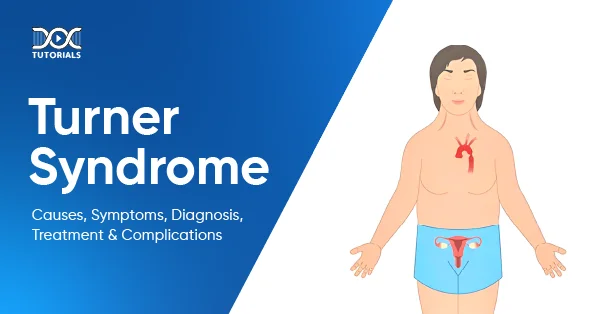Turner Syndrome: Causes, Symptoms, Diagnosis, Treatment, and Complications

Turner syndrome is one of the most frequent sex chromosomal-related disorders, present in approximately 1 in every 2,500 female births. It is characterised by symptoms like a low stature and late onset of puberty, among others, and can result in a number of health conditions, like cardiovascular issues, autoimmune disorders, bone conditions, etc.
Thus, it is crucial to know the causes, symptoms, diagnosis, and treatment options for Turner syndrome to facilitate early diagnosis and help prevent complications. Also, if you are a medical aspirant or healthcare provider, learning about this genetic disorder will help broaden your knowledge and make better diagnoses.
Keep reading!
What is Turner Syndrome?
Also known as Turner’s syndrome, it is a genetic disorder that occurs in females and is caused by a missing or incomplete X chromosome. It influences physical growth, fertility, and the function of certain internal organs.
Unlike most other chromosomal disorders, which affect both males and females, Turner syndrome is only found in females. Additionally, it is not an inherited condition and is instead a product of random genetic mutants in fetal development.
Currently, researchers do not have any idea of the actual reason behind this disorder.
What are the Causes and Risk Factors of Turner Syndrome?
This sex chromosomal-related disorder is caused by the loss or structural anomaly of one of the two female X chromosomes. Usually, there are two X chromosomes (XX) in females. However, in the case of Turner syndrome, there is a complete or partial absence of one (or, in rare cases, both) of these X chromosomes.
This genetic change can happen in various ways:
- Monosomy X: The most common form, where an entire X chromosome is absent from all body cells.
- Mosaic Turner Syndrome: A less common type, where some cells have the normal XX pair, and others are missing one (one X chromosome).
- Inherited Turner syndrome: In a few rare cases, babies can inherit Turner Syndrome through their biological parent, which usually happens because of a missing part of the X chromosome
Risk Factors for Turner Syndrome
Following is an overview of the risk factors associated with Turner Syndrome:
- It is most commonly caused by random genetic events that occur when there is a defect in the sperm or egg cell division process.
- However, it is not an inherited condition, although a family history of certain chromosomal abnormalities can cause concern.
- As the underlying cause is largely random, Turner syndrome is not predictable or preventable. However, early diagnosis and medical treatment can effectively manage associated health challenges.
What are the Symptoms of Turner Syndrome?
Turner syndrome symptoms vary widely among individuals. Some may have noticeable physical differences, while others may only experience mild symptoms. The most common Turner’s syndrome symptoms include:
Physical Features
- Short stature, with height significantly below average.
- Webbed neck (extra skin folds between neck and shoulders).
- Low-set ears and a small jaw.
- High-arched palate.
- Broad chest with widely spaced nipples.
- Puffy hands and feet at birth.
- Skeletal abnormalities, including scoliosis or osteoporosis.
Health-Related Symptoms
- Turner syndrome chromosome abnormalities often result in ovarian failure, leading to infertility.
- Delayed puberty due to insufficient oestrogen production.
- Increased risk of congenital heart defects.
- Kidney and thyroid problems.
- Hearing loss and frequent ear infections.
- Increased risk of autoimmune disorders like Hashimoto’s thyroiditis.
- Learning difficulties, particularly in math and spatial reasoning.
How is Turner Syndrome Diagnosed?
Turner syndrome requires early diagnosis to ensure proper management. Physicians have several diagnostic techniques, including:
Prenatal Testing
- Amniocentesis or Chorionic Villus Sampling (CVS): Diagnoses foetuses with chromosomal abnormalities.
- Noninvasive Prenatal Testing (NIPT) Maternal Blood Test: Checks chromosome abnormalities in the foetus.
Postnatal Diagnosis
- Karyotype Test: A blood test that analyses chromosomes to confirm that Turner syndrome is present.
- Hormonal Testing: Measures oestrogen and other hormones to assess the function of the ovaries.
- Imaging Tests: These include echocardiograms, which are ultrasounds of the heart, and other ultrasounds to look for heart and kidney problems.
- Growth and Developmental Assessments: Height and pubertal monitoring of the child.
What are the Treatment Options for Turner Syndrome?
As of now, there is no cure for Turner syndrome. However, treatment can help manage symptoms and improve quality of life. Hormonal therapies are fundamental in resolving growth and development problems:
- HGH therapy has commonly is administered in childhood to help increase height and sustain bone health.
- Oestrogen Replacement Therapy (ERT) is crucial for puberty and is generally continued for the maintenance of bone density.
- Sometimes, progesterone therapy is initiated to help ease menstrual cycles.
Fertility treatment can offer options for women with Turner syndrome, include:
- In vitro fertilization (IVF) with donor eggs enables certain women to conceive.
- Ovarian tissue cryopreservation may protect fertility in select patients.
Other medical interventions are often needed beyond hormonal and fertility treatments:
- Regular cardiac monitoring is essential in assessing heart health, given that people with Turner syndrome have a higher risk of heart malformations.
- Tests for the kidney are also suggested to identify any structural abnormalities to be picked up at an early stage.
- Hearing aids might be mandatory in cases of hearing impairment, which can help improve the quality of life significantly.
- Therapeutic support, such as cognitive and behavioural therapy, can assist with dealing with social and learning difficulties.
What are the Tips for Living with Turner Syndrome?
Treatment of Turner syndrome is primarily educational, social, and health-oriented, and all are required to ensure well-being. To help individuals live with this condition, here are some pointers to follow:
- Verbal skills enable individuals to communicate and interact with the world around them, while occupational therapy helps individuals improve motor and sensory skills.
- Many patients benefit from targeted learning programs. They are designed to support the subjects or topics which they are struggling to learn in reading and math.
- Psychological support (including counselling) builds self-esteem and assists in interpersonal relationships.
- Another aspect of career guidance is the planning phase, which involves planning careers that are in sync with an individual’s capabilities and strengths.
Furthermore, it is crucial to have a healthy lifestyle. In this regard:
- Obesity can be avoided, and the risk of osteoporosis can be lowered through a balanced diet and regular physical exercise.
- Regular medical checkups are needed to keep an eye on heart health, bone density, and reproductive health so that any complications that may arise can be addressed early.
- Participating in support groups can provide additional connection and a sense of community where they can share experiences and receive encouragement.
- Therapy, kindness, and mindfulness practices can help maintain emotional health, and effectively deal with issues like stress and anxiety.
What are the Complications Associated with Turner Syndrome?
If a child with Turner syndrome does not receive proper treatment, several complications may arise:
- Heart Disease: Congenital heart defects are predominant and can need surgical intervention.
- Osteoporosis: Loss of bone density is a risk due to an oestrogen deficiency.
- Hearing Loss: Frequent illnesses may lead to lifelong hearing issues.
- Mental Health Problems: Social challenges can lead to anxiety and/or depression.
- Infertility: The majority of women with Turner syndrome cannot conceive naturally.
- Obesity & Diabetes: Metabolic imbalances elevate the risk of such conditions.
FAQs About Turner Syndrome
- Is Turner syndrome inherited?
Turner syndrome is not inherited. It results from random chromosomal abnormalities in the course of fetal development.
- Can Turner syndrome be detected before birth?
Yes, Turner syndrome may be diagnosed using prenatal tests, including amniocentesis, chorionic villus sampling, and noninvasive prenatal testing (NIPT).
- What are the main health risks associated with Turner syndrome?
Women with Turner syndrome can have heart defects, kidney problems, infertility, osteoporosis, hearing impairment, and learning disabilities.
- Can females with Turner syndrome have children?
Women with Turner syndrome usually have fertility issues. However, assisted reproductive technologies such as in vitro fertilisation (IVF) with donor oocytes can allow them to conceive.
- How is Turner syndrome treated?
Treatment may involve growth hormone therapy, oestrogen replacement therapy, fertility treatments, and regular screening for related health risks.
- What is the life expectancy of someone with Turner syndrome?
Women with Turner syndrome have a normal life expectancy. However, they need to manage complications like heart disease and diabetes.
Conclusion
Although there is currently no cure for Turner syndrome, appropriate medical treatment, therapy, and support, can help individuals lead a normal life. Early diagnosis is key to preventing further complications, and opting for psychological support and career guidance is key to improving the quality of life.
DocTutorials covers several other topics related to medicine to help MBBS and NEET PG aspirants broaden their knowledge base. Also, we provide high-quality video lectures, mock tests, question banks, expert guidance, and more to ensure the best preparation for your medical exam. Enroll in our NEET PG courses today and grab that medical seat like a champ!
Latest Blogs
-

NEET PG Exam 2025- Date, Pattern, Marking Scheme, Subject Wise Weightage, and Exam Mode
NEET PG Exam 2025 is the ultimate gateway for medical graduates aspiring to pursue postgraduate courses in medicine, including MD,…
-

INI CET Exam 2025: Your Roadmap to Success – Key Topics, Strategies, and Lessons from Last Year’s Papers
The INI CET exam is more than just a test; it’s a significant milestone for many medical students aiming to…
-

INI CET Exam Success: Previous Year Question Papers & Ultimate Guide – INI CET PYQ
One can feel overwhelmed while preparing for the INI CET (Institute of National Importance Combined Entrance Test). A vast syllabus,…




